64 have author last names that start with G have author last names that start with G

Since the 1980s a distinctive suburban politics has emerged in the United States, Juliet F. Gainsborough argues in Fenced Off . As suburbs have become less economically and socially dependent on the central cities, suburban and urban dwellers have diverged not only in their voting patterns but also in their thinking about national politics. While political reporters have long noted this difference, few quantitative studies have been conducted on suburbanization alone—above and beyond race or class—as a political trend.
Using census and public opinion statistics, along with data on congressional districts and party platforms, Gainsborough demonstrates that this "ideology of localism" weakens when suburbs experience city-like problems and strengthens when racial and economic differences with the nearby city increase. In addition, Gainsborough uses national survey data from the 1950s to the 1990s to show that a separate suburban politics has arisen only during the last two decades.
Further, she argues, the political differences between urban and suburban voters have found expression in changes in congressional representation and new electoral strategies for the major political parties. As Congressional districts become increasingly suburban, "soccer moms" and liveability agendas come to dominate party platforms, and the needs of the urban poor disappear from political debate. Fenced Off uses the tools of political science to prove what political commentators have sensed—that the suburbs offer a powerful voting bloc that is being courted with sophisticated new strategies.
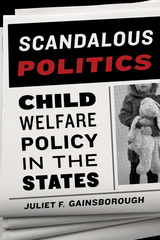
Little work has been done to systematically analyze how high-profile incidents of child neglect and abuse shape child welfare policymaking in the United States. In Scandalous Politics, Juliet Gainsborough presents quantitative analysis of all fifty states and qualitative case studies of three states (Florida, Colorado, and New Jersey) that reveal how well-publicized child welfare scandals result in adoption of new legislation and new administrative procedures.
Gainsborough’s quantitative analysis suggests that child welfare policymaking is frequently reactive, while the case studies provide more detail about variations and the legislative process. For example, the case studies illustrate how the nature and extent of the policy response varies according to particular characteristics of the political environment in the state and the administrative structure of the child welfare system.
Scandalous Politics increases our understanding of the politics of child welfare at both the state and federal level and provides new insights into existing theories of agenda-setting and the policy process. It will be of interest to everyone involved with child welfare policymaking and especially public policy and public administration scholars.

Western moral and political theory in the last two centuries has widely held that morality and politics are independent of a divine reality. Claiming that this consensus is flawed, prominent theologian Franklin I. Gamwell argues that there is a necessary relation between moral worth and belief in God. Without appealing to the beliefs of any specific religion, Gamwell defends a return to the view that moral and political principles depend on a divine purpose.
To separate politics from the divine misrepresents the distinctive character of human freedom, Gamwell maintains, and thus prevents a full understanding of the nature of justice. Principles of justice define "democracy on purpose" as the political form in which we pursue the divine good.
Engaging in a dialogue with such major representatives of the dominant consensus as Kant, Habermas, and Rawls, and informed by the philosophical writings of Alfred North Whitehead, this book makes the case for a neoclassical metaphysics that restores a religious sensibility to our political life.

Serving the public interest with integrity requires a moral perspective that can rise above the day-to-day pressures of the job. This book integrates Western philosophy’s most significant ethical theories and merges them with public administration theory to provide public administrators with an explicit moral foundation for ethical decision making.
Ethics in the Public Service reviews moral thought through the ages, from Plato to Rorty, and makes the philosophies of the more difficult thinkers accessible to both students and practitioners. Unifying seemingly disparate ethical positions, including those of Aristotle, Kant, and Mill, the authors defend the idea of objective moral truth and critique subjectivist views, refuting postmodernism and ethical relativism. Using their integrated objective approach, they tackle such dichotomies in public administration theory as bureaucracy vs. democracy, and they also examine a case study in an administrative setting.
Offering a better understanding of moral dilemmas rather than a formula, this book presents scholars and practitioners with a framework that is both objective and flexible, theoretical and practical. This original synthesis provides a comprehensive basis for administrative thought and action.
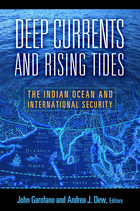
The Indian Ocean region has rapidly emerged as a hinge point in the changing global balance of power and the geographic nexus of economic and security issues with vital global consequences. The security of energy supplies, persistent poverty and its contribution to political extremism, piracy, and related threats to seaborne trade, competing nuclear powers, and possibly the scene of future clashes between rising great powers India and China—all are dangers in the waters or in the littoral states of the Indian Ocean region.
This volume, one of the first attempts to treat the Indian Ocean Region in a coherent fashion, captures the spectrum of cooperation and competition in the Indian Ocean Region. Contributors discuss points of cooperation and competition in a region that stretches from East Africa, to Singapore, to Australia, and assess the regional interests of China, India, Pakistan, and the United States. Chapters review possible “red lines” for Chinese security in the region, India’s naval ambitions, Pakistan’s maritime security, and threats from non-state actors—terrorists, pirates, and criminal groups—who challenge security on the ocean for all states.
This volume will interest academics, professionals, and researchers with interests in international relations, Asian security, and maritime studies.

During the Cold War, the political leadership of the Soviet Union avidly sought intelligence about its main adversary, the United States. Although effective on an operational level, Soviet leaders and their intelligence chiefs fell short when it came to analyzing intelligence. Soviet leaders were often not receptive to intelligence that conflicted with their existing beliefs, and analysts were reluctant to put forward assessments that challenged ideological orthodoxy.
There were, however, important changes over time. Ultimately the views of an enlightened Soviet leader, Gorbachev, trumped the ideological blinders of his predecessors and the intelligence service’s dedication to an endless duel with their ideologically spawned “main adversary," making it possible to end the Cold War.
Raymond Garthoff draws on over five decades of personal contact with Soviet diplomats, intelligence officers, military leaders, and scholars during his remarkable career as an analyst, senior diplomat, and historian. He also builds on previous scholarship and examines documents from Soviet and Western archives. Soviet Leaders and Intelligence offers an informed and highly readable assessment of how the Soviets understood—and misunderstood—the intentions and objectives of their Cold War adversary.
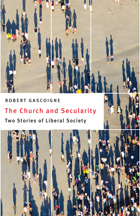
Western liberal societies are characterized by two stories: a positive story of freedom of conscience and the recognition of community and human rights, and a negative story of unrestrained freedom that leads to self-centeredness, vacuity, and the destructive compromise of human values. Can the Catholic Church play a more meaningful role in assisting liberal societies in telling their better story?
Australian ethicist Robert Gascoigne thinks it can. In The Church and Secularity he considers the meaning of secularity as a shared space for all citizens and asks how the Church can contribute to a sensitivity to—and respect for—human dignity and human rights. Drawing on Augustine’s City of God and Vatican II’s Gaudium et spes, Gascoigne interprets the meaning of freedom in liberal societies through the lens of Augustine’s “two loves,” the love of God and neighbor and the love of self, and reveals how the two are connected to our contemporary experience.
The Church and Secularity argues that the Church can serve liberal societies in a positive way and that its own social identity, rooted in Eucharistic communities, must be bound up with the struggle for human rights and resistance to the commodification of the human in all its forms.

Modern psychological and political theory meet head-on in this powerful re-evaluation of America's contradictory and sometimes dangerous addiction to individualism. Best-selling author Gaylin and co-author Jennings investigate the contentious intersections of interdependence and autonomy, rights and public responsibility. They examine the painful abrasion occurring between America's tradition of personal freedom and privacy, as it rubs against the still valuable if almost vanishing ideals of sacrifice and social order.
Our current culture of autonomy—championed by both liberals on the left and libertarians on the right—is based on the idea of rationality as the motivation for human conduct. But, as the authors remind us, people are not simply rational creatures—appeals to emotions are always far more effective than logical argument in changing our behavior.
This timely edition includes a new preface; updated examples and illustrations throughout; and new coverage of contemporary social critics and their work since the publication of the first edition. Two essential new chapters, one on the movement to forgo life-sustaining treatment and the other on physician-assisted suicide, particularly clarify the authors' arguments. Drawing on these and numerous other illustrations—with significant emphasis on the state of American health care—Gaylin and Jennings demonstrate that society has not just the right but the duty to occasionally invoke fear, shame, and guilt in order to motivate humane behavior.
As cases of AIDS are once again on the upswing, as the dangerously mentally ill are allowed to wander free and untreated, as starvation and poverty still hold too many in its grip in the richest nation on the planet, this controversial book, considerably revised and expanded, is needed more than ever. If we are to indeed preserve and nurture a genuinely free—and liberal—society, the authors suggest that these "coercions" may be essential for the health and the maturity of a nation where we all too often avert our eyes, not seeing that our neighbor is in pain or trouble and needs our help.

On a Monday in August 2004, three Muslim girls sat with each other on the floor of a mosque surrounded by boxes of books. Two wore traditional Muslim dress, their companion was dressed Western style, but their intention was the same. They were involved in a project to distribute almost 2 million dollars worth of books, DVDs, and videos to over 300 British public libraries. Their aim was not to convert or proselytize but to educate the public about their faith and try to offset the negative image of Islam that has developed since 9/11. Perhaps of more significance was the fact that the books used for the project were not the 'insider' literature produced by the mosques, but works of Western academics that approached their subject in a neutral and informative manner.
Ron Geaves offers a thematic and experiential exploration of the Muslim religion and world that shows it is not some homogenous entity but the dynamic faith you would expect to find in a religion over fourteen centuries old, consisting of over a billion people stretching from the USA to China.
Readers of the book require no previous knowledge of the subject. Chapters are dedicated to individual topics and range from a look at Western media representation of Islam, through controversial issues such as martyrdom, shari'a law, jihad, and the place of women. It examines the ideas of community, Sufism, fundamentalism and other sects within the faith, and also explains the source of many of the interpretations of the Prophet Mohammed, and the importance of the Muslim concept of unity.
By examining the divisions that exist within contemporary Islam, Geaves makes a special contribution to the ongoing examination of today's Muslim communities. By offering a way to better understand this tradition, Geaves helps to counteract the oversimplifications that seem to dominate popular discourse about Muslims and instead shows them as participants in a religious tradition that is still unfolding, struggling to recognize and respect its diversities while seeking to maintain a unity that all parts of it acknowledge as central.

Daily political events and the steady inevitability of globalism require that informed students and citizens learn something about religious traditions foreign to their own. Designed for both classroom and general use, these handy Key Words guidebooks are essential resources for those who want clear and concise explanations of common terms and unfamiliar concepts of major world religions.
Each pocket-sized volume contains definitions for over 400 terms from religious principles and significant periods to noteworthy figures.
A quick sampling of terms from this volume:
BodhisattvaBhavanaJaramaranaKalachakraMalaMantraNirvanaSamadhiZen
Sample Definitions:
Brahma Viharas: The four sublime states of loving kindness, compassion, sympathetic joy, and evenness of mind achieved by the practice of bhavana (see bhavana, metta, karuna, mudita, upekkha).
Jaramarana: Old age and death. The final link in the causal chain of existence which arises from jati or birth. The Buddha left his palace to search for enlightenment after experiencing the shock of seeing old age, sickness and death (see jati, Siddharta Gotma,. nidanas, samsara).

Daily political events and the steady inevitability of globalism require that informed students and citizens learn something about religious traditions foreign to their own. Designed for both classroom and general use, these handy Key Words guidebooks are essential resources for those who want clear and concise explanations of common terms and unfamiliar concepts of major world religions.
Each pocket-sized volume contains definitions for over 400 terms from religious principles and significant periods to noteworthy figures.
A quick sampling of terms from this volume:
AscensionBeatificationCatechismEvangelicalHumanae vitaeLast SupperMartyrRepentanceSermon on the Mount
Sample Definitions:
Catechism The manual of Christian doctrine in a questions and answer format generally associated with teaching those preparing for Confirmation (see Confirmation).
Sermon on the Mount The famous discourse of Jesus described in Chapter 5 of Matthew's gospel which provides the basis of Christian ethics (see Beatitudes, Lord's Prayer).

Daily political events and the steady inevitability of globalism require that informed students and citizens learn something about religious traditions foreign to their own. Designed for both classroom and general use, these handy Key Words guidebooks are essential resources for those who want clear and concise explanations of common terms and unfamiliar concepts of major world religions.
Each pocket-sized volume contains definitions for over 400 terms from religious principles and significant periods to noteworthy figures.
A quick sampling of terms from this volume:
AshramBrahmanDharmaGyanaJanmashtamiKalpaMantraRamayanaUpanishads
Sample Definitions:
Ashram Lit. shelter. A retreat place or hermitage used for spiritual development and often the centre of teaching for a particular guru or sect.
Gyana Spiritual knowledge. Sometimes it is understood that such knowledge can be learned by the study of scriptures but it is also used to describe knowledge that arises from direct experience of God (Brahman) or realization of the Self (atman). The relationship between these two informs different theories concerning spiritual knowledge (see Vedanta, atman, Brahman, jnana).

Daily political events and the steady inevitability of globalism require that informed students and citizens learn something about religious traditions foreign to their own. Designed for both classroom and general use, these handy Key Words guidebooks are essential resources for those who want clear and concise explanations of common terms and unfamiliar concepts of major world religions.
Each pocket-sized volume contains definitions for over 400 terms from religious principles and significant periods to noteworthy figures.
A quick sampling of terms from this volume:
AhwalDa'waHajjIzzatMadrasaRamadanShari'aWatanZakat
Sample Definitions:
Izzat (Urdu) The concept of honour or family pride. Izzat functions as an eclectic mixture of Islamic codes and local customs which the family members are expected to observe. Non-observance leads to disgrace for the individual and the family.
Ramadan/Ramazan (U) The ninth month of the Muslim year which is observed as a fast lasting from sunrise to sunset. The fast is one of the five pillars of Islam and during this period Muslims should abstain from food, water and sexual activity. The fast is commanded by Allah in the Qur'an and is therefore obligatory for all adult Muslims except in special circumstances such as illness or menstruation. In such circumstances it is permissible to make up the period of the fast at a later date. The period of Ramadan includes some of the holiest occasions of the Muslim year such as the Night of Power that marks the first revelation of the Qur'an to Muhammad. The fast ends with the festival of Eid al-Fitr. The month of Ramadan is a period of extra religious sensitivity and many Muslims who are not usually observant will attend the mosque and perform their prayers five times a day. The fast provides an opportunity to reflect on religious matters and pass a month in prayer but is also considered to be a means of creating empathy for the poor and needy in the community (see itikaf, Eid al-Fitr, Laylat ul-Qadr).

Daily political events and the steady inevitability of globalism require that informed students and citizens learn something about religious traditions foreign to their own. Designed for both classroom and general use, these handy Key Words guidebooks are essential resources for those who want clear and concise explanations of common terms and unfamiliar concepts of major world religions.
Each pocket-sized volume contains definitions for over 400 terms from religious principles and significant periods to noteworthy figures.
A quick sampling of terms from this volume:
BeritEmunahHarosetKaddishMezzuzahRosh HashanahShabatYeshivaZionism
Sample Definitions:
Emunah Lit. Faith. The foundation of the Jewish tradition, it essentially refers to trust in God and reliance on Him to guide the people perfectly. If a person trusts completely in God, everything else will fall into place.
Yeshiva/Yeshivah A college for the study of Torah and Talmud. Although Jewish males had always engaged in study of the Torah under the guidance of their Rabbis, in the nineteenth century, organized colleges appeared in eastern Europe which allowed progression through the various stages of study. Secular study was not permitted and some students spent a lifetime in study of Torah, Talmud and Halakhah (see Torah, Talmud, Halakhah).

Daily political events and the steady inevitability of globalism require that informed students and citizens learn something about religious traditions foreign to their own. Designed for both classroom and general use, these handy Key Words guidebooks are essential resources for those who want clear and concise explanations of common terms and unfamiliar concepts of major world religions.
Each pocket-sized volume contains definitions for over 400 terms from religious principles and significant periods to noteworthy figures.
A quick sampling of terms from this volume:
AgnosticismCanonExegesisGraceLiberation TheologyMonotheismParableRitualTheocracy
Sample Definitions:
Exegesis The process of explaining a sacred text in order to penetrate further into the author's meaning or to apply new interpretations based upon contemporary situations or enhanced knowledge (see hermeneutics, sacred texts).
Monotheism The worship of one God regarded as the sole and universal creator of the universe, typically expressed in the religions of Judaism, Islam and Christianity. However varieties of monotheism can also be found in Indian traditions. Monotheistic beliefs classically assert that such a deity is personal, caring for and involving itself in the affairs of human beings through revelation (see deism, monism, henotheism, polytheism, revelation).

John Cuthbert Ford, SJ (1902-1989) was one of the leading American Catholic moralists of the 20th century. This is the first full-length analysis of his work and influence, one that not only reveals a traditionally Catholic method of moral analysis but also illuminates the conflicts behind and development of Catholic moral teaching during the volatile 1960s.
Ford is best known for his influential contribution to Catholic teachings on three moral issues. His objection to the Allied practice of obliteration bombing during WWII by drawing a sharp distinction between combatants and noncombatants is still studied widely today. Ford campaigned for alcohol education for both clergy and laity and introduced a pastoral approach for assisting and counseling alcoholics. As a member of the Papal Commission on Population, Family, and Birth Rate during the 1960s, Ford was an unyielding defender of the traditional Catholic teaching on birth control that still reigns today.
Drawing on the published works and personal papers of Ford, Eric Genilo begins with a brief description of the theologian's life, career, and influence. The book is divided into two parts. In Part I, Method, Genilo offers an overview of Ford's moral theology in the "manualist" tradition—a 300-year period during which Catholic priests used manuals to instruct the faithful on matters of morality and sin. Genilo then examines Ford's two modes of resolving moral cases and presents Ford's approach to doctrinal development. In Part II, Moral Objectivity, Genilo shows how Ford confronted the growing situation ethics movement, then moves to how he understood freedom and subjective culpability, particularly in the case of alcoholism. Later chapters reveal Ford's theological conflicts with Josef Fuchs, SJ on the issue of birth control, his staunch opposition to totalitarianism, and his moral analysis of how society should treat marginalized persons threatened by the abuse of power.
Genilo concludes with an assessment of Ford's legacy to the development and practice of moral theology, leaving the reader with an in-depth portrait of an extraordinary man who dedicated his life to defending the Church and protecting the most vulnerable persons in society.

John A. Gentry and Joseph S. Gordon update our understanding of strategic warning intelligence analysis for the twenty-first century. Strategic warning—the process of long-range analysis to alert senior leaders to trending threats and opportunities that require action—is a critical intelligence function. It also is frequently misunderstood and underappreciated. Gentry and Gordon draw on both their practitioner and academic backgrounds to present a history of the strategic warning function in the US intelligence community. In doing so, they outline the capabilities of analytic methods, explain why strategic warning analysis is so hard, and discuss the special challenges strategic warning encounters from senior decision-makers. They also compare how strategic warning functions in other countries, evaluate why the United States has in recent years emphasized current intelligence instead of strategic warning, and recommend warning-related structural and procedural improvements in the US intelligence community. The authors examine historical case studies, including postmortems of warning failures, to provide examples of the analytic points they make. Strategic Warning Intelligence will interest scholars and practitioners and will be an ideal teaching text for intermediate and advanced students.

Germain Grisez has been a leading voice in moral philosophy and theology since the Second Vatican Council. In this book, such major thinkers as John Finnis, Ralph McInerny, and William E. May consider issues in ethics, metaphysics, and politics that have been central to Grisez's work.
Grisez's reconsideration of the philosophical foundations of Christian moral teaching, seeking to eliminate both legalistic interpretation and theological dissent, has won the support of a number of leading Catholic moralists. In the past decade, moreover, many philosophers outside of Catholicism have weighed carefully Grisez's alternatives to theories that have long dominated secular moral philosophy.
This book presents a broad spectrum of viewpoints on subjects ranging from contraception to capital punishment and considers such controversies as the scriptural basis of Grisez's work his interpretations of Aquinas, and his new natural law theory. The collection includes not only contributions from Grisez's supporters but also from critics of his thought, from proportionalist Edward Collins Vacek, SJ, to the neo-Thomist Ralph McInerny. A reply by Grisez, written with Joseph M. Boyle Jr., addresses the issues and viewpoints expressed, while an afterword by Russell Shaw reviews Grisez's pioneering work and conveys a vivid sense of the philosopher's personality.
As Grisez's influence grows, this volume will serve as an important touchstone on his contributions to moral and political philosophy and theology.

"Public reason" is one of the central concepts in modern liberal political theory. As articulated by John Rawls, it presents a way to overcome the difficulties created by intractable differences among citizens' religious and moral beliefs by strictly confining the place of such convictions in the public sphere.
Identifying this conception as a key point of conflict, this book presents a debate among contemporary natural law and liberal political theorists on the definition and validity of the idea of public reason. Its distinguished contributors examine the consequences of interpreting public reason more broadly as "right reason," according to natural law theory, versus understanding it in the narrower sense in which Rawls intended. They test public reason by examining its implications for current issues, confronting the questions of abortion and slavery and matters relating to citizenship.
This energetic exchange advances our understanding of both Rawls's contribution to political philosophy and the lasting relevance of natural law. It provides new insights into crucial issues facing society today as it points to new ways of thinking about political theory and practice.

This second edition of The National Security Enterprise provides practitioners’ insights into the operation, missions, and organizational cultures of the principal national security agencies and other institutions that shape the US national security decision-making process. Unlike some textbooks on American foreign policy, it offers analysis from insiders who have worked at the National Security Council, the State and Defense Departments, the intelligence community, and the other critical government entities. The book explains how organizational missions and cultures create the labyrinth in which a coherent national security policy must be fashioned. Understanding and appreciating these organizations and their cultures is essential for formulating and implementing it. Taking into account the changes introduced by the Obama administration, the second edition includes four new or entirely revised chapters (Congress, Department of Homeland Security, Treasury, and USAID) and updates to the text throughout. It covers changes instituted since the first edition was published in 2011, implications of the government campaign to prosecute leaks, and lessons learned from more than a decade of war in Afghanistan and Iraq. This up-to-date book will appeal to students of US national security and foreign policy as well as career policymakers.
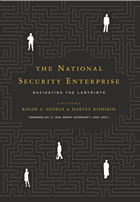
Recent breakdowns in American national security have exposed the weaknesses of the nation’s vast overlapping security and foreign policy bureaucracy and the often dysfunctional interagency process. In the literature of national security studies, however, surprisingly little attention is given to the specific dynamics or underlying organizational cultures that often drive the bureaucratic politics of U.S. security policy.
The National Security Enterprise offers a broad overview and analysis of the many government agencies involved in national security issues, the interagency process, Congressional checks and balances, and the influence of private sector organizations. The chapters cover the National Security Council, the Departments of Defense and State, the Office of the Director of National Intelligence, the Central Intelligence Agency, the Federal Bureau of Investigation, the Department of Homeland Security, and the Office of Management and Budget. The book also focuses on the roles of Congress, the Supreme Court, and outside players in the national security process like the media, think tanks, and lobbyists. Each chapter details the organizational culture and personality of these institutions so that readers can better understand the mindsets that drive these organizations and their roles in the policy process.
Many of the contributors to this volume are long-time practitioners who have spent most of their careers working for these organizations. As such, they offer unique insights into how diplomats, military officers, civilian analysts, spies, and law enforcement officials are distinct breeds of policymakers and political actors. To illustrate how different agencies can behave in the face of a common challenge, contributors reflect in detail on their respective agency’s behavior during the Iraq War.
This impressive volume is suitable for academic studies at both the undergraduate and graduate level; ideal for U.S. government, military, and national security training programs; and useful for practitioners and specialists in national security studies.
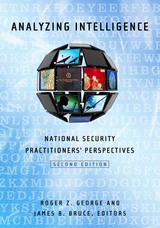
Analyzing Intelligence, now in a revised and extensively updated second edition, assesses the state of the profession of intelligence analysis from the practitioner's point of view. The contributors—most of whom have held senior positions in the US intelligence community—review the evolution of the field, the rise of new challenges, pitfalls in analysis, and the lessons from new training and techniques designed to deal with 21st century national security problems. This second edition updates this indispensable book with new chapters that highlight advances in applying more analytic rigor to analysis, along with expertise-building, training, and professional development. New chapters by practitioners broaden the original volume’s discussion of the analyst-policymaker relationship by addressing analytic support to the military customer as well as by demonstrating how structured analysis can benefit military commanders on the battlefield.
Analyzing Intelligence is written for national security practitioners such as producers and users of intelligence, as well as for scholars and students seeking to understand the nature and role of intelligence analysis, its strengths and weaknesses, and steps that can improve it and lead it to a more recognizable profession.
The most comprehensive and up-to-date volume on professional intelligence analysis as practiced in the US Government, Analyzing Intelligence is essential reading for practitioners and users of intelligence analysis, as well as for students and scholars in security studies and related fields.

Drawing on the individual and collective experience of recognized intelligence experts and scholars in the field, Analyzing Intelligence provides the first comprehensive assessment of the state of intelligence analysis since 9/11. Its in-depth and balanced evaluation of more than fifty years of U.S. analysis includes a critique of why it has under-performed at times. It provides insights regarding the enduring obstacles as well as new challenges of analysis in the post-9/11 world, and suggests innovative ideas for improved analytical methods, training, and structured approaches.
The book's six sections present a coherent plan for improving analysis. Early chapters examine how intelligence analysis has evolved since its origins in the mid-20th century, focusing on traditions, culture, successes, and failures. The middle sections examine how analysis supports the most senior national security and military policymakers and strategists, and how analysts must deal with the perennial challenges of collection, politicization, analytical bias, knowledge building and denial and deception. The final sections of the book propose new ways to address enduring issues in warning analysis, methodology (or "analytical tradecraft") and emerging analytic issues like homeland defense. The book suggests new forms of analytic collaboration in a global intelligence environment, and imperatives for the development of a new profession of intelligence analysis.
Analyzing Intelligence is written for the national security expert who needs to understand the role of intelligence and its strengths and weaknesses. Practicing and future analysts will also find that its attention to the enduring challenges provides useful lessons-learned to guide their own efforts. The innovations section will provoke senior intelligence managers to consider major changes in the way analysis is currently organized and conducted, and the way that analysts are trained and perform.

The rapid rise of managed care in the United States has introduced new complexities into ethical dilemmas in health care by changing the traditional relationships among health plans, payers, providers, and patients. Through twenty case studies that provide snapshots of a wide range of ethical challenges, this book explores the goals, methods, and practices of managed care.
Accompanying each case are questions for consideration and a pair of commentaries by prominent contributors from diverse fields. Through the cases and commentaries, this book clarifies the internal workings of managed care, explains relevant concepts, and offers practical, constructive guidance in addressing the ethical and policy issues.
The cases address a broad spectrum of issues concerning rationing shared resources, financial incentives, quality of care, and responsibilities to patients, vulnerable populations, and the community. Specific topics range from coverage of emergency services through funding medical education to respecting patients' religious beliefs and caring for the seriously mentally ill.
This casebook offers a wealth of insights into critical issues that affect the delivery of managed care in an increasingly competitive market. It will be invaluable for those managing the delivery and financing of health care and for students and practitioners of the health professions and health administration, as well as interested recipients of managed care.

Americans have witnessed inconsistent and seemingly dramatic turnabouts in legislators' attitudes toward trade, with strong bipartisan support for free trade and the Uruguay Round in one instant and heated debate over participation in the World Trade Organization the next. Martha L. Gibson systematically traces the competing forces that interject conflict into an overall consensus on the value of a liberalized trade policy.
Cutting through the tangled web of congressional politics, Gibson shows why it is impossible to understand trade legislation without first understanding how electoral politics and the institutional rules of Congress distort legislators' interests, incentives, and policy goals. Gibson's book clearly shows that trade legislation is not made in a vacuum but is just one in a series of simultaneous games with competing goals in which legislators engage to satisfy the conflicting demands of constituents.

A timely philosophical treatment of the current wave of international terrorism and armed conflicts around the world, New Terror, New Wars explores the ethical significance of September 11, and its aftermath. From the nationalistic violence that reigned over the last century, to the amorphous terrors without national boundaries characterizing the opening of this new century, Gilbert leads the way through some of the difficult terrain that has brought the world to these troubling crossroads. He examines the causes of new wars as they are made manifest in the politics of identity, he questions when military force is justified in the pursuit of political goals. He asks whether the "just war" theory is adequate for evaluating and then regulating contemporary conflicts. He deals with the core issues of traditional conflict: self-defense, the conduct of war, hatred and revenge, but also with newer forms, such as conflict in the guise of "humanitarian intervention."
The hopeful conclusion to all wars is, of course, the restoration of peace. Gilbert concludes with a philosophical investigation of not only how to end them, but also how to resolve the conflicts that gave rise to them in the first place and how to produce the conditions in which they are unlikely to occur again—reminding us that the end to a "just war" must be a "just peace" and outlining what the nature of that just peace should be. New Terror, New Wars will be required reading for all those concerned with the ethical issues that inevitably arise from armed conflicts in whatever dire form they may take.

Wars of national secession and ethnic cleansing, based on the claims of supposedly distinct racial, ethnic, cultural, and national identities, have disfigured recent years. Probing the roots of these conflicts, this book provides the first comprehensive survey of the full range of political theories of ethnicity and nationalism.
Paul Gilbert explores the role of identity in configuring contemporary states. He examines the concepts of race, ethnicity, cultural identity, and nationality, as well as the relevant political theories, including liberalism, communitarianism, and postmodernism. He also covers in depth the topics of citizenship and migration, multiculturalism and the ethics of secession. His multidisciplinary approach will be of value to those in philosophy, politics, sociology, and cultural studies.

The relationship between religious belief and sexuality as personal attributes exhibits some provocative comparisons. Despite the nonestablishment of religion in the United States and the constitutional guarantee of free exercise, Christianity functions as the religious and moral standard in America. Ethical views that do not fit within this consensus often go unrecognized as moral values. Similarly, in the realm of sexual orientation, heterosexuality is seen as the yardstick by which sexual practices are measured. The notion that "alternative" sexual practices like homosexuality could possess ethical significance is often overlooked or ignored.
In her new book, An Argument for Same-Sex Marriage, political scientist Emily Gill draws an extended comparison between religious belief and sexuality, both central components of one’s personal identity. Using the religion clause of the First Amendment as a foundation, Gill contends that, just as US law and policy ensure that citizens may express religious beliefs as they see fit, it should also ensure that citizens may marry as they see fit. Civil marriage, according to Gill, is a public institution, and the exclusion of some couples from a state institution is a public expression of civic inequality.
An Argument for Same-Sex Marriage is a passionate and timely treatment of the various arguments for and against same-sex marriage and how those arguments reflect our collective sense of morality and civic equality. It will appeal to readers who have an interest in gay and lesbian studies, political theory, constitutional law, and the role of religion in the contemporary United States.
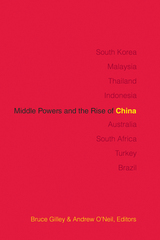
China’s rise is changing the dynamics of the international system. Middle Powers and the Rise of China is the first work to examine how the group of states referred to as “middle powers” are responding to China’s growing economic, diplomatic, and military power. States with capabilities immediately below those of great powers, middle powers still exercise influence far above most other states. Their role as significant trading partners and allies or adversaries in matters of regional security, nuclear proliferation, and global governance issues such as human rights and climate change are reshaping international politics.
Contributors review middle-power relations with China in the cases of South Korea, Malaysia, Thailand, Indonesia, Australia, South Africa, Turkey, and Brazil, addressing how these diverse nations are responding to a rising China, the impact of Chinese power on each, and whether these states are being attracted to China or deterred by its new power and assertiveness. Chapters also explore how much (or how little) China, and for comparison the US, value middle powers and examine whether or not middle powers can actually shape China’s behavior. By bringing a new analytic approach to a key issue in international politics, this unique treatment of emerging middle powers and the rise of China will interest scholars and students of international relations, security studies, China, and the diverse countries covered in the book.

Most decision making in environmental policy today is based on the economic cost-benefit argument. Criticizing the shortcomings of the market paradigm, John Martin Gillroy proposes an alternative way to conceptualize and create environmental policy, one that allows for the protection of moral and ecological values in the face of economic demands.
Drawing on Kantian definitions of who we are as citizens, how we act collectively, and what the proper role of the state is, Gillroy develops a philosophical justification for incorporating non-market values into public decision making. His new paradigm for justice toward nature integrates the intrinsic value of humanity and nature into the law.
To test the feasibility of this new approach, Gillroy applies it to six cases: wilderness preservation, national wildlife refuges, not-in-my-backyard (NIMBY) siting dilemmas, comparative risk analysis, the Food and Drug Administration's risk regulation, and the National Environmental Policy Act. He also encourages others to adapt his framework to create alternative policy models from existing philosophies.
This book offers new insights, models, and methods for policymakers and analysts and for scholars in philosophy, political theory, law, and environmental studies.
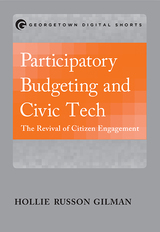
In a time when citizens are deeply dissatisfied with the basic institutions and elected officials that govern them, the participatory budgeting movement empowers citizens to get results for pressing community needs. It creates a transparent process where citizens can propose projects through traditional community meetings or use civic technologies to provide input online, work with elected officials to craft budget proposals, and vote on where and how to spend public funds. Unlike other forms of civic engagement, participatory budgeting involves spending real public money on the priorities that the community identifies.
In this brief work, Hollie Russon Gilman explains the history and concepts of participatory budgeting. First used abroad, participatory budgeting has been piloted in Chicago, New York City, Boston, and several other cities across the United States since 2009. She relates participatory budgeting to other forms of civic innovation and proposes ways for new digital tools to increase entry points for civic engagement. This brief and accessible work is an ideal introduction to participatory budgeting for students, scholars, and practitioners.
Georgetown Digital Shorts—longer than an article, shorter than a book—deliver timely works of peer-reviewed scholarship for a fast-paced world. They present new ideas and original content that are easily digestible for students, scholars, and general readers.

This book is the first to analyze the institutions, successes, and failures of the People's Democratic Party of Afghanistan, the pro-Soviet regime that sought to dominate the country during the years of the Soviet military presence. Antonio Giustozzi explores the military, political, and social strategies of the predominantly urban and Marxist regime as it struggled—and ultimately failed—to win the support of a largely rural and Islamic population.
Drawing on many Soviet materials not previously used by Western writers, including unpublished Red Army documents and interviews with participants, Giustozzi provides valuable new insights into the cold war and the rise of Islamic revolt.
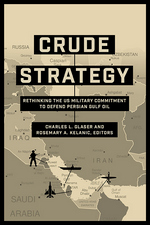
Should the United States ask its military to guarantee the flow of oil from the Persian Gulf? If the US security commitment is in fact strategically sound, what posture should the military adopt to protect Persian Gulf oil?
Charles L. Glaser and Rosemary A. Kelanic present a collection of new essays from a multidisciplinary team of political scientists, historians, and economists that provide answers to these questions. Contributors delve into a range of vital economic and security issues: the economic costs of a petroleum supply disruption, whether or not an American withdrawal increases the chances of oil-related turmoil, the internal stability of Saudi Arabia, budgetary costs of the forward deployment of US forces, and the possibility of blunting the effects of disruptions with investment in alternative energy resources. The result is a series of bold arguments toward a much-needed revision of US policy toward the Persian Gulf during an era of profound change in oil markets and the balance of power in the Middle East.

In Body Parts, E. Richard Gold examines whether the body and materials derived from it—such as human organs and DNA—should be thought of as market commodities and subject to property law. Analyzing a series of court decisions concerning property rights, Gold explores whether the language and assumptions of property law can help society determine who has rights to human biological materials.
Gold observes that the commercial opportunities unleashed by advances in biotechnology present a challenge to the ways that society has traditionally valued the human body and human health. In a balanced discussion of both commercial and individual perspectives, Gold asserts the need to understand human biological materials within the context of human values, rather than economic interests.
This perceptive book will be welcomed by scholars and other professionals engaged in questions regarding bioethics, applied ethics, the philosophy of value, and property and intellectual property rights. Given the international aspects of both intellectual property law and biotechnology, this book will be of interest throughout the world and especially valuable in common-law (most English-speaking) countries.

As the federal government has cut back its support for domestic services, state governments increasingly have been forced to assume a leadership position. In this book, prominent experts describe and analyze how state governments in the 1990s have coped with fiscal stress through changes in tax and spending policies, as well as through attempts to "reinvent government" by abandoning long-established policies.
In an era when state budgets verge on the brink of deficit, state governments face the difficult task of reconciling the public's wish for low taxes with its desire for increased services—better schools, improved health systems, more prisons. This volume provides both a comparative overview of the fifty states as they try to meet conflicting needs and incisive case studies of six states with a reputation for being national leaders—California, Connecticut, Florida, Massachusetts, Michigan, and Minnesota. It explores how much substance there is to claims that states were successful in developing innovative policies.
The Fiscal Crisis of the States draws upon research to analyze what is really happening in the state capitols. Boiling down the diverse experiences of various states into a number of important lessons, this book will be a valuable resource for academics, policymakers, and public administrators, as well as the general reader, to understand the reality of state fiscal policies.

During the 1980s and early 1990s, Australia and New Zealand extensively deregulated their economies to create two of the most open markets in the industrialized world. Drawing on interviews with more than 180 leading policymakers in Australia and New Zealand—including former prime ministers, ministers of finance, treasurers, and public servants—Shaun Goldfinch analyzes the factors that made the deregulation process different in each country.
Describing specific policies—including liberalization of financial and capital markets, lowering of trade barriers, the floating of the exchange rate, and privatization—he compares the "crash-through" approach that characterized reform in New Zealand with the "bargained consensus" that underpinned change in Australia. In Australia, influences on policy were relatively diffuse and implementations open and decentralized. New Zealand’s more centralized government structure resulted in a concentration of influence and less deliberation. He contrasts rapid and gradual change, arguing that the latter may yield better policy results and prevent political instability.
Shedding new light on the economic policymaking process, including the role of economic ideas, institutions, and policy elites, this book will appeal to both students and professionals in interested in public policy, comparative politics, and economics.
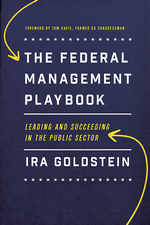
Stories of government management failures often make the headlines, but quietly much gets done as well. What makes the difference? Ira Goldstein offers wisdom about how to lead and succeed in the federal realm, even during periods when the political climate is intensely negative, based on his decades of experience as a senior executive at two major government consulting firms and as a member of the US federal government's Senior Executive Service.
The Federal Management Playbook coaches the importance of always keeping four key concepts in mind when planning for success: goals, stakeholders, resources, and time frames. Its chapters address how to effectively motivate government employees, pick the right technologies, communicate and negotiate with powerful stakeholders, manage risks, get value from contractors, foster innovation, and more. Goldstein makes lessons easy to apply by breaking each chapter’s plans into three strategic phases: create an offensive strategy, execute your plan effectively, and play a smart defense. Additional tips describe how career civil servants and political appointees can get the most from one another, advise consultants on providing value to government, and help everyone better manage ever-present oversight.
The Federal Management Playbook is a must-read for anyone working in the government realm and for students who aspire to public service.
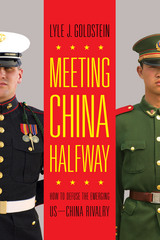
Though a US-China conflict is far from inevitable, major tensions are building in the Asia-Pacific region. These strains are the result of historical enmity, cultural divergence, and deep ideological estrangement, not to mention apprehensions fueled by geopolitical competition and the closely related “security dilemma.”
Despite worrying signs of intensifying rivalry, few observers have provided concrete paradigms to lead this troubled relationship away from disaster. This book is dramatically different in that Lyle J. Goldstein’s focus is on laying bare both US and Chinese perceptions of where their interests clash and proposing new paths to ease bilateral tensions through compromise. Each chapter contains a “cooperation spiral” —the opposite of an escalation spiral—to illustrate these policy proposals. Goldstein makes one hundred policy proposals over the course of this book to inaugurate a genuine debate regarding cooperative policy solutions to the most vexing problems in US-China relations.
Goldstein not only parses findings from American scholarship but also breaks new ground by analyzing hundreds of Chinese-language sources, including military publications, never before evaluated by Western experts. Meeting China Halfway, new in paperback, remains a refreshing and unique contribution to the study of the world’s most important bilateral relationship.

However exciting new technologies and educational tools may seem, they can become solely for entertainment unless their design, use, and evaluation are guided by principles of education and language development. Task-based Language Teaching (TBLT) provides an excellent approach for teachers who want to realize the potential of technology to engage learners and improve language learning inside and outside the classroom.
This practical guide shows teachers how to successfully incorporate technology into TBLT in the classroom and to develop technology-mediated materials. Whether the goal is to conduct a needs analysis, to develop classroom or homework materials, or to implement a new approach of student assessment, A Practical Guide to Integrating Technology into Task-Based Language Teaching will be a welcome resource for language teachers at all levels.
Designed for use in the classroom as well as for independent study, the book includes reflective questions, activities, and further reading at the end of each chapter. Examples of units in Chinese, Spanish, ESL, and the hospitality industry are provided.
Georgetown Digital Shorts—longer than an article, shorter than a book—deliver timely works of peer-reviewed scholarship for a fast-paced world. They present new ideas and original content that are easily digestable for students, scholars, and general readers.
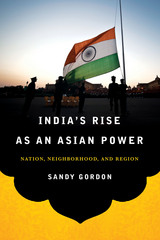
India’s Rise as an Asian Power examines India’s rise to power and the obstacles it faces in the context of domestic governance and security, relationships and security issues with its South Asian neighbors, and international relations in the wider Asian region. Instead of a straight-line projection based on traditional measures of power such as population size, economic growth rates, and military spending, Sandy Gordon’s nuanced view of India’s rise focuses on the need of any rising power to develop the means to deal with challenges in its domestic, neighborhood (South Asia), and regional (continental) spheres.
Terrorism, insurgency, border disputes, and water conflict and shortages are examples of some of India’s domestic and regional challenges. Gordon argues that before it can assume the mantle of a genuine Asian power or world power, India must improve its governance and security; otherwise, its economic growth and human development will continue to be hindered and its vulnerabilities may be exploited by competitors in its South Asian neighborhood or the wider region. This book will appeal to students and scholars of India and South Asia, security studies, foreign policy, and comparative politics, as well as country and regional specialists.

Appointed by Pope John XXIII to the Pontifical Commission on Population, Family, and Birth, Fuchs ultimately found himself disappointed in his three years of service and spent the next thirty years exploring a broad array of issues pivotal to a reconstruction of Roman Catholic natural law theory. This is the first full-length analysis of Fuchs's efforts.
Beginning historically by looking at Fuchs's writings and beliefs before the Pontifical Commission appointment, including his defense of natural law during the "situation ethics" debates of the 50s and 60s, the concept of personal salvation, and the status of "nature" and "human nature," Graham moves to the intellectual conversion that inspired Fuchs to reconsider his concepts following the commission appointment. From there, Graham engages in a sustained critique of Fuchs's natural theory, addressing both the strengths and weaknesses to be found there and suggest possible avenues of development that would make a positive contribution to the ongoing quest to rehabilitate the Roman Catholic natural law theory that continues to dominate the landscape of moral theology today.

E-Textbooks are now available to purchase or rent through VitalSource.com! Please visit VitalSource for more information on pricing and availability.
As of January 1, 2021, the Smart Sparrow Companion Websites are no longer available. Soon, we will announce a new set of companion websites. Demos for the new companion websites will be available for instructors to sample beginning in spring 2021. The complete websites will be ready in time for students to use them during the fall 2021 semester.
Until the new companion websites become available, eBook Workbooks with exercises from the Smart Sparrow Electronic Workbook are available for purchase on the GUP website and VitalSource.com, as are Workbook Answer Keys. They will both be sold in eBook format only.
Comme on dit, a comprehensive first-year French textbook program, engages students in the learning process from day one using an inductive methodology centered on guided observation and rule discovery. Together with students’ communicative needs and an analysis of their most pervasive transfer errors from English, the everyday speech patterns of 100 native speakers—culled from 150 hours of unscripted recordings—form the linguistic backbone of the method. Using a workbook format, students examine, compare, and contrast this wide variety of authentic discourse to discover both individual and shared language use and cultural perspectives. Additionally, students systematically and progressively acquire the fundamental sounds and rhythmic patterns of spoken French, which leads them to develop solid pronunciation and conversational fluency as well as notable listening comprehension skills. To aid instructors in effectively implementing this distinctive approach, the Teacher’s Edition textbook comes with answers for all activities, plus teaching notes in the margins and extensive ancillary resources online. By the end of one academic year, students with no prior French instruction can expect to achieve Intermediate-Mid to Intermediate-High proficiency on the ACTFL scale.
Features of Comme on dit:
• Emphasis on providing students with the tools and skills to help them communicate early on about topics relevant to them and their daily lives• Equal focus on all four major skill areas—reading, writing, listening, and speaking—and on the establishment of a solid grammatical and lexical foundation• Over 1,000 audio and video files, giving students ample material to practice listening to French as it is spoken by native speakers• Over 250 snippets of written authentic discourse, ranging from book titles to proverbs• Teacher’s Edition textbook with answers for all activities, plus teaching notes in the margins• Extensive ancillary instructor’s resources, including an instructor’s manual, quizzes, sample midterm and final exams, available at CommeOnDitTextbook.com
For Instructors: To sample the eTextbook, please visit VitalSource.com to create an account. After you login, you may request a free copy by clicking on "Faculty Sampling" in the upper right-hand corner, searching for the "Digital Exam Copy," and selecting "Request Sample".

Comme on dit with website, a comprehensive first-year French textbook program, engages students in the learning process from day one using an inductive methodology centered on guided observation and rule discovery. Together with students' communicative needs and an analysis of their most pervasive transfer errors from English, the everyday speech patterns of 100 native speakers—culled from 150 hours of unscripted recordings—form the linguistic backbone of the method. The accompanying companion website–included with the book–offers audio and fully integrated exercises to use alongside the text.
Students examine, compare, and contrast this wide variety of authentic discourse to discover both individual and shared language use and cultural perspectives. Additionally, students systematically and progressively acquire the fundamental sounds and rhythmic patterns of spoken French, which leads them to develop solid pronunciation and conversational fluency as well as notable listening comprehension skills. By the end of one academic year, students with no prior French instruction can expect to achieve Intermediate-Mid to Intermediate-High proficiency on the ACTFL scale.
To aid instructors in effectively implementing this distinctive approach, the Teacher's Edition textbook comes with answers for all activities, plus teaching notes in the margins and extensive ancillary resources online.
Features
• Emphasis on providing students with the tools and skills to help them communicate early on about topics relevant to them and their daily lives
• Equal focus on all four major skill areas—reading, writing, listening, and speaking—and on the establishment of a solid grammatical and lexical foundation
• Over 1,000 audio and video files, giving students ample material to practice listening to French as it is spoken by native speakers
• Over 250 snippets of written authentic discourse, ranging from book titles to proverbs
For Instructors: Please submit print exam and desk copy requests for the Teacher’s Edition using ISBN 978-1-64712-212-6. The Teacher’s Edition includes answers for all activities, plus teaching notes in the margins.

C'est ce qu'on dit with Website is a second-year (intermediate-level) companion textbook to the beginning-level textbook Comme on dit, and as such follows the same basic format and principles: students work with hundreds of samples of authentic, nonscripted spoken and written French and are led in a step-by-step manner from rule discovery to the acquisition of speaking, reading, writing, and listening competence. The homework activities and inductive presentation of grammar guarantee a completely student-centered approach, as student input is required in each and every exercise. Given the more advanced focus of C'est ce qu'on dit, exercises lead students to expand their competence not just with conversational registers but with formal written and spoken registers, as well. The accompanying companion website–included with the book–offers audio and fully integrated exercises to use alongside the text.
Programs that take advantage of the full range of speaking, listening, reading, writing, grammar, and cultural expansion activities in C'est ce qu'on dit will find it to be a robust standalone program; however, in the event that programs prefer to include an outside content component, suggestions are offered in the preface and throughout each unit for ways to free up classroom time. By the end of C'est ce qu'on dit, an average student can be expected to have attained the competency objectives described as Advanced-Low on the ACTFL proficiency scale and as a B1 level on the Common European Framework scale (CEFR).
To aid instructors in effectively implementing this distinctive approach, the Teacher's Edition textbook comes with answers for all activities, plus teaching notes in the margins and extensive ancillary resources online.
For Instructors: Please submit print exam and desk copy requests for the Teacher’s Edition using ISBN 978-1-64712-213-3. The Teacher’s Edition includes answers for all activities, plus teaching notes in the margins.

Observations on the new American republic by an early president of Georgetown University
Father Giovanni Antonio Grassi was the ninth president of Georgetown University and pioneered its transition into a modern institution, earning him the moniker Georgetown’s Second Founder. Originally published in Italian in 1818 and translated here into English for the first time, his News on the Present Condition of the Republic of the United States of North America records his rich observations of life in the young republic and the Catholic experience within it.
When Grassi assumed his post as president in 1812, he found the university, known then as Georgetown College, to be in a “miserable state.” He immediately set out to enlarge and improve the institution, increasing the number of non-Catholics in the school, adding to the library’s holdings, and winning authority from Congress to confer degrees. Upon his return to Italy, Grassi published his News, which introduced Italians to the promise and contradictions of the American experiment in self-governance and offered perspectives on the social reality for Catholics in America.
This book is a fascinating work for historians of Catholicism and of the Jesuits in particular.
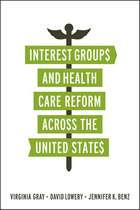
Universal health care was on the national political agenda for nearly a hundred years until a comprehensive (but not universal) health care reform bill supported by President Obama passed in 2010. The most common explanation for the failure of past reform efforts is that special interests were continually able to block reform by lobbying lawmakers. Yet, beginning in the 1970s, accelerating with the failure of the Clinton health care plan, and continuing through the passage of the Affordable Care Act in 2010, health policy reform was alive and well at the state level.
Interest Groups and Health Care Reform across the United States assesses the impact of interest groups to determine if collectively they are capable of shaping policy in their own interests or whether they influence policy only at the margins. What can this tell us about the true power of interest groups in this policy arena? The fact that state governments took action in health policy in spite of opposing interests, where the national government could not, offers a compelling puzzle that will be of special interest to scholars and students of public policy, health policy, and state politics.

The Christian Right never ceases to surprise professional observers of American politics. With the Christian coalition in disarray, many expected that the movement would play less of a role in the 2004 elections. But when exit polls reported that "moral values" were the most commonly cited reason for presidential vote choice, pundits immediately proclaimed the importance of the "values vote." Yet the role of the Christian Right, of statewide referenda on same-sex marriage, and of religious mobilization remained the subject of debate. The Values Campaign? The Christian Right and the 2004 Elections reaches well beyond the instant analyses of the post-election period to provide an assessment of the role of the religious right in 2004. The contributors to this volume are among the leading scholars of religion and politics in the United States, and many have contributed for over a decade to ongoing discussions of the role played by the religious right in national elections.
The authors consider national mobilization and issues, and also explore the role of the Christian Right in specific states. Their evaluations contend that the "values campaign" was not an aberration but a consistent pattern of national politics, and that moral traditionalism will likely continue to be a significant factor in future elections.
A timely study of the 2004 elections, this volume will appeal to scholars and observers of electoral politics, state politics, and religion and politics.

In the wake of the Clinton-Lewinsky scandal, the Christian Right expected major victories in the 1998 elections. Instead, many of its allies lost close contests, and the movement was seen as a liability in some high-profile campaigns. In the only in-depth study of the Christian Right's role in these races, leading scholars analyze the role of the movement in fourteen key states, from Maine to California, and address speculations that the movement is fading from the American political scene.
The book focuses on elections on the state and local levels, where the Christian Right is most influential, and it describes the movement's niche in some detail. Although each campaign described in the book had its unique characteristics, the editors have drawn some broad conclusions about the 1998 elections. While the movement was weak in the areas of candidate recruitment and fundraising, they say, the outcome may have also been related to external factors including a broader turnout of typically Democratic constituencies and the country's boredom with the scandal that conservatives had made the centerpiece of their campaign. Despite the setbacks of 1998, the contributors argue, the Christian Right continues to have an enormous influence on the political dialogue of the country.
Written from an unbiased, nonpartisan perspective, this volume sheds light on a topic that is too frequently mired in controversy.

From the first rumblings of the Moral Majority over twenty years ago, the Christian Right has been marshalling its forces and maneuvering its troops in an effort to re-shape the landscape of American politics. It has fascinated social scientists and journalists as the first right-wing social movement in postwar America to achieve significant political and popular support, and it has repeatedly defied those who would step up to write its obituary. In 2000, while many touted the demise of the Christian Coalition, the broader undercurrents of the movement were instrumental in helping George W. Bush win the GOP nomination and the White House. Bush repaid that swell of support by choosing Senator John Ashcroft, once the movement's favored presidential candidate, as attorney general.
The Christian Right in American Politics, under the direction of three of the nation's leading scholars in the field of religion and politics, recognizing the movement as a force still to be reckoned with, undertakes the important task of making an historical analysis of the Christian Right in state politics during its heyday, 1980 to the millennium. Its twelve chapters, written by outstanding scholars, review the impact and influence of the Christian Right in those states where it has had its most significant presence: South Carolina, Virginia, Texas, Florida, Michigan, Iowa, Kansas, Minnesota, Colorado, California, Maine, and Oregon and Washington.
Since 1980, scholars have learned a good deal about the social characteristics, religious doctrine, and political beliefs of activists in and supporters of the Christian Right in these states, and each contribution is based on rigorous, dispassionate scholarship. The writers explore the gains and losses of the movement as it attempts to re-shape political landscapes. More precisely, they provide in-depth descriptions of the resources, organizations, and the group ecologies in which the Christian Right operates-the distinct elements that drove the movement forward.
As the editors state, "the Christian Right has been engaged in a long and torturous 'march toward the millennium,' from outsider status into the thick of American politics." Those formative years, 1980-2000, are essential for any understanding of this uniquely American social movement. This rigorous analysis over many states and many elections provides the clearest picture yet of the goals, tactics, and hopes of the Christian Right in America.

Drawing on the controversial case of “Ashley X,” a girl with severe developmental disabilities who received interventionist medical treatment to limit her growth and keep her body forever small—a procedure now known as the “Ashley Treatment”—Reconsidering Intellectual Disability explores important questions at the intersection of disability theory, Christian moral theology, and bioethics.
What are the biomedical boundaries of acceptable treatment for those not able to give informed consent? Who gets to decide when a patient cannot communicate their desires and needs? Should we accept the dominance of a form of medicine that identifies those with intellectual impairments as pathological objects in need of the normalizing bodily manipulations of technological medicine?
In a critical exploration of contemporary disability theory, Jason Reimer Greig contends that L'Arche, a federation of faith communities made up of people with and without intellectual disabilities, provides an alternative response to the predominant bioethical worldview that sees disability as a problem to be solved. Reconsidering Intellectual Disability shows how a focus on Christian theological tradition’s moral thinking and practice of friendship with God offers a way to free not only people with intellectual disabilities but all people from the objectifying gaze of modern medicine. L'Arche draws inspiration from Jesus's solidarity with the "least of these" and a commitment to Christian friendship that sees people with profound cognitive disabilities not as anomalous objects of pity but as fellow friends of God. This vital act of social recognition opens the way to understanding the disabled not as objects to be fixed but as teachers whose lives can transform others and open a new way of being human.

Public silence in policymaking can be deafening. When advocates for a disadvantaged group decline to speak up, not only are their concerns not recorded or acted upon, but also the collective strength of the unspoken argument is lessened—a situation that undermines the workings of deliberative democracy by reflecting only the concerns of more powerful interests.
But why do so many advocates remain silent on key issues they care about and how does that silence contribute to narrowly defined policies? What can individuals and organizations do to amplify their privately expressed concerns for policy change?
In Healthy Voices, Unhealthy Silence, Colleen M. Grogan and Michael K. Gusmano address these questions through the lens of state-level health care advocacy for the poor. They examine how representatives for the poor participate in an advisory board process by tying together existing studies; extensive interviews with key players; and an in-depth, first-hand look at the Connecticut Medicaid advisory board's deliberations during the managed care debate. Drawing on the concepts of deliberative democracy, agenda setting, and nonprofit advocacy, Grogan and Gusmano reveal the reasons behind advocates' often unexpected silence on major issues, assess how capable nonprofits are at affecting policy debates, and provide prescriptive advice for creating a participatory process that adequately addresses the health care concerns of the poor and dispossessed.
Though exploring specifically state-level health care advocacy for the poor, the lessons Grogan and Gusmano offer here are transferable across issue areas and levels of government. Public policy scholars, advocacy organizations, government workers, and students of government administration will be well-served by this significant study.

In this expanded and revised edition of a fresh and original case-study textbook on environmental ethics, Christine Gudorf and James Huchingson continue to explore the line that separates the current state of the environment from what it should be in the future.
Boundaries begins with a lucid overview of the field, highlighting the key developments and theories in the environmental movement. Specific cases offer a rich and diverse range of situations from around the globe, from saving the forests of Java and the use of pesticides in developing countries to restoring degraded ecosystems in Nebraska. With an emphasis on the concrete circumstances of particular localities, the studies continue to focus on the dilemmas and struggles of individuals and communities who face daunting decisions with serious consequences. This second edition features extensive updates and revisions, along with four new cases: one on water privatization, one on governmental efforts to mitigate global climate change, and two on the obstacles that teachers of environmental ethics encounter in the classroom. Boundaries also includes an appendix for teachers that describes how to use the cases in the classroom.

Formerly known as The Annual of the Society of Christian Ethics, it will now bear the official title: The Journal of the Society of Christian Ethics. Instead of appearing as an annual, the Journal will begin appearing twice a year in 2003—in the spring and in the fall. The Journal will continue to be an essential resource for students and faculty pursuing the latest developments in Christian and religious ethics, publishing refereed scholarly articles as well as a professional resources section on teaching and scholarship in ethics—a preeminent source for further research.

Formerly known as the Annual of the Society of Christian Ethics, this is the second volume of the first year of appearing biannually in its new incarnation and an essential resource for students and faculty pursuing the latest developments in Christian and religious ethics.

The Journal of the Society of Christian Ethics continues to be an essential resource for students, faculty, and scholars in search of the latest developments, thinking, and issues in the world of Christian and religious ethics.

The Journal of the Society of Christian Ethics continues to be an essential resource for students, faculty, and scholars in search of the latest developments, thinking, and issues in the world of Christian and religious ethics.

Formerly known as The Annual of the Society of Christian Ethics, it will now bear the official title: Journal of the Society of Christian Ethics. Instead of appearing as an annual, the Journal will appear twice a year—in the spring and in the fall. The Journal will continue to be an essential resource for students and faculty pursuing the latest developments in Christian and religious ethics, publishing refereed scholarly articles as well as a professional resources section on teaching and scholarship in ethics—a preeminent source for further research.

The Journal of the Society of Christian Ethics is an essential resource for students, faculty, and scholars in search of the latest developments and thinking in Christian and religious ethics.

The Journal of the Society of Christian Ethics continues to be an essential resource for students, faculty, and scholars in search of the latest developments, thinking, and issues in the world of Christian and religious ethics.

The Journal of the Society of Christian Ethics continues to be an essential resource for students and faculty pursuing the latest developments in Christian and religious ethics, publishing refereed scholarly articles as well as a professional resource section on teaching and scholarship in ethics—a preeminent source for further research. The Journal also contains book reviews of the latest scholarship available.
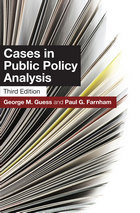
Combining the insights of an economist and a political scientist, this new third edition of Cases in Public Policy Analysis offers real world cases to provide students with the institutional and political dimensions of policy problems as well as easily understood principles and methods for analyzing public policies.
Guess and Farnham clearly explain such basic tools as problem-identification, forecasting alternatives, cost-effectiveness analysis, and cost-benefit analysis and show how to apply these tools to specific cases. The new edition offers a revised framework for policy analysis, practical guidelines for institutional assessment, and five new action-forcing cases. Up-to-date materials involving complex policy issues, such as education reform, cigarette smoking regulation, air pollution control, public transit capital planning, HIV/AIDS prevention strategies, and prison overcrowding are also included.
Bridging the gap between methods and their application in real life, Cases in Public Policy Analysis will be of interest to professors involved with upper-division and graduate-level policy courses, as well as an excellent sourcebook in applied policy training for government practitioners and consultants.

Sonido y sentido lifts the learning of Spanish pronunciation for American English-speaking students to a new level, with support of an accompanying CD. Written in Spanish by a native speaker who is a leading figure in the field of Spanish phonology, this introduction to Spanish phonetics and phonology will improve both the pronunciation and understanding of spoken Spanish by demonstrating the specific ways in which the sound pattern of Spanish differs from English. Notable in that it explains the "why" of pronunciation with specific information on how the sounds of Spanish are organized—it also highlights the most important differences among varieties within the Spanish-speaking world. Together, the book and CD emphasize the sounds and sound combinations that are most problematic for English speakers learning Spanish.
In addition to a clear theoretical analysis of Spanish phonology, Sonido y sentido introduces the fundamental concepts of language, Spanish language, and the teaching and learning of phonetics—Spanish phonetics in particular. Utilizing the International Phonetic Alphabet (IPA) throughout the text to make for more precise phonetic descriptions, Guitart also discusses the relation between both the physical and psychological aspects of pronunciation.
Sonido y sentido contains exercises, both transcription and pronunciation drills, and each chapter concludes with a section, "Para pensar," which tests comprehension of the concepts presented. Answers to the "Para pensar" exercises appear in a separate appendix. A glossary of technical terms, a subject index, and a basic bibliography of Spanish phonetics and phonology round out this fresh and rewarding contribution to learning the Spanish language.

A concise and accessible introduction to natural law ethics, this book introduces readers to the mainstream tradition of Western moral philosophy. Building on philosophers from Plato through Aquinas to John Finnis, Alfonso Gómez-Lobo links morality to the protection of basic human goods — life, family, friendship, work and play, the experience of beauty, knowledge, and integrity — elements essential to a flourishing, happy human life.
Gómez-Lobo begins with a discussion of Plato's Crito as an introduction to the practice of moral philosophy, showing that it requires that its participants treat each other as equals and offer rational arguments to persuade each other. He then puts forth a general principle for practical rationality: one should pursue what is good and avoid what is bad. The human goods form the basis for moral norms that provide a standard by which actions can be evaluated: do they support or harm the human goods? He argues that moral norms should be understood as a system of rules whose rationale is the protection and enhancement of human goods. A moral norm that does not enjoin the preservation or enhancement of a specific good is unjustifiable. Shifting to a case study approach, Gómez-Lobo applies these principles to a discussion of abortion and euthanasia. The book ends with a brief treatment of rival positions, including utilitarianism and libertarianism, and of conscience as our ultimate moral guide.
Written as an introductory text for students of ethics and natural law, Morality and the Human Goods makes arguments consistent with Catholic teaching but is not based on theological considerations. The work falls squarely within the field of philosophical ethics and will be of interest to readers of any background.

Bioethics and the Human Goods offers students and general readers a brief introduction to bioethics from a “natural law” philosophical perspective. This perspective, which traces its origins to classical antiquity, has profoundly shaped Western ethics and law and is enjoying an exciting renaissance. While compatible with much in the ethical thought of the great religions, it is grounded in reason, not religion. In contrast to the currently dominant bioethical theories of utilitarianism and principlism, the natural law approach offers an understanding of human flourishing grounded in basic human goods, including life, health, friendship, and knowledge, and in the wrongness of intentionally turning against, or neglecting, these goods.
The book is divided into two sections: Foundations and Issues. Foundations sketches a natural law understanding of the important ethical principles of autonomy, non-maleficence, beneficence, and justice and explores different understandings of “personhood” and whether human embryos are persons. Issues applies a natural law perspective to some of the most controversial debates in contemporary bioethics at the beginning and end of life: research on human embryos, abortion, infanticide, euthanasia, the withdrawal of tube-feeding from patients in a “persistent vegetative state,” and the definition of death. The text is completed by appendices featuring personal statements by Alfonso Gómez-Lobo on the status of the human embryo and on the definition and determination of death.
READERS
Browse our collection.
PUBLISHERS
See BiblioVault's publisher services.
STUDENT SERVICES
Files for college accessibility offices.
UChicago Accessibility Resources
home | accessibility | search | about | contact us
BiblioVault ® 2001 - 2024
The University of Chicago Press









